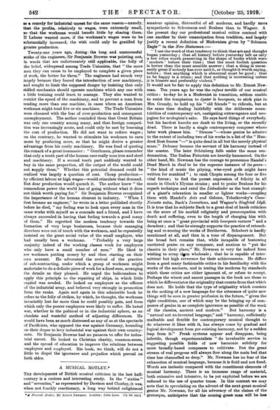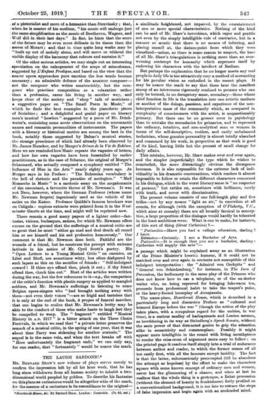A MUSICAL MOTLEY.*
THE development of British musical criticism in the last halfcentury is a curious and interesting study. In the " sixties" and "seventies," as represented by Davison and Chorley, it was, when not frankly reactionary, a long way behind enlightened amateur opinion, distrustful of all moderns, and hardly more sympathetic to Schuman* and Brahms than to Wagner. A
the present day our professional musical critics contend with one another In their--emancipation from tradition, and largely justify a recent definition of Modernism given by " Solomon
Eagle" in the Net° Statesman,..,— " I use the• word of that tendency to think that art and thought began. yesterday ; that all history before yesterday left us only a few relics worth preserving in the shape of books which were ' modern ' before their time ; that the most foolish question is better than the most sensible answer ; that a thing is necessarily great if nobody has ever said it, or thought it worth saying, before ; that anything which is abnormal must be good ; that to be happy is a crime ; and that nothing is interesting unless it is bizarre and preferably violent."
It would not be fair to apply this definition to Mr. Ernest New
man. Ten years ago he was theenfant terrible of our musical critics : toelay he is a Modernist in transition, seldom unable to resist the temptation to epater is bourgeois, to stink pins in
Mrs. Grundy, to hold up his " old friends " to ridicule, but at the same time dealing faithfully with the deliberate ecoentricities of contemporary art, castigating extravagance and -neo logism for neologism's sake. He says hard things of everybody, but his hardest knocks are dealt to the living, or the recently' dead. There is hardly a single contemporary composer whose
later work pleases him. " Strauss "—whose genius he admires to the extent of including two of his works in St list of the " Hundred Beat Scores "—" is quite dead in all but the merely physical sense." Debussy became the servant of hisharmony instead of the • master. The later Schonberg falls under thesame condemnation. The Italian Futurists are heavily hammered. On the other hand, Mr. Newman has the courage to pronounce Handel's Dead March in Said to be the supreme instance of its genre " the kind of music the pitying, -wise-eyed gods might have written for mankind " ; to rank Chopin among the four or five
vital forces ; to find the purest expression of felicity in all music in Gluck's Elysian strains ; and to praise Brahms for his
superb technique and extol the Liebeslied,er as the best example of a giant's relaxation in smaller or lighter works—coupling them with Handel's Avis and Galatea, Tchaikovsky's CaneNoisette suite, Bach's Inventions, and Wagner's Siegfried Idyll.
It is true that he subjects Bach to a great-deal of harsh criticism on the score of his morbid religiosity and preoccupation with death and suffering, even to the length of charging him with
being at once a " great provincial with bourgeois corners and a decadent ; and that 'he strongly supports the practice of retouch
ing and re-scoring the works of Beethoven. Schubert-is hardly mentioned at all, and then in a tone of disparagement. But the broad feet remains that, while incapable of bestowing unstinted praise on any composer, and anxious to " put the classics in their plade," Mr. Newman is very far indeed from wishing to scrap dam wholesale ; that he is capable of inter mittent but high reverence for their achievements. He differs from a good many fashionable critics in his familiarity with the works of the ancients, and in testing the moderns by standards which these critics are either ignorant of, or refuse to accept.
Perhaps the wisest and sanest passages in the book are those in which he differentiates the originality that counts from that which does not. He holds that the type of originality which consists in the making of a new language, for the utterance of quite new things will be seen in greater profusion in the future," given the right conditions, one of 'which may be the bringing up of com
posers of genius in as complete ignorance as possible of the work of the classics, ancient and modern.' But harmony ill "natural not an invented language," and " harmony, sufficiently malleable and flexible for contemporary musical thought to do whatever it likes with it, has-always come by gradual and logical development from pre-existing harmony, not by a sudden•
leap from it." Freak systems appear and disappear, being infertile, though experimentalists " do invaluable service in suggesting possible fields of new harmonic subtlety for more broadly-based composers to cultivate. But the great stream of real progress will always flow along the main bed that time has channelled so deep." Mr. Newman has no fear of the exhaustion of musical language, because it is fluid and not fixed.
Words are inelastic compared with the constituent elements of musioal harmony. There is an • immense range of material, both extensive and intensive, to be yet exploited before we are reduced to the use of quarter tones. In this context we may
note that in speculating on the advent-of the next great musical genius Mr. Newman, for 'all his -advocacy ofthe claims of the grotesque, anticipates that the coming great' man will be less of a pictorialist and more. of a humanist than -Stravinsky ;. that, -when.he is master of his-medium, "hismusic ,will undergo just , the same _simplification as. the. music of -Beethoven, Wagner, and :-Wolf did: In their last days." In fine, he hints that the score of .'the future may be even more delicate, in its tissue than the ?mores of Mozart ; and: that in. time quite long works may be "built up out of melody alone,. and -will move us without the visible display of the-harmonyy that colours and sustains it."
Of the other-serious articles, we may single out an interesting speculation on the enlargement of the scope of mimodrama, suggested by L'Enfant Prodigue, and based on the view that the .nearer opera: approaches pure emotion the less words become 4. necessary ; an admirable defence of the amateur composer. not the composer who writes amateurishly, but the corn, poser who practises composition • as a -relaxation rather than a profession, earns his -living in ..another way, and keeps _clear of the• society and ".shop " talk of musicians ; a suggestive paper :on " The .Small Poem in Music," of which he . finds, the best examples in. the pianoforte pieces • of Scriabine ; and a :delightful and .genial . paper on literary men's -musical `5 howlers "..auggested. by a poem of Mr. Drinkwater's, containing some acute observations on the unromantic names_ and romantic. personalities of instruments. The papers with a literary or historical motive are among the best in the book, notably those suggested by Balzac's musical stories, .-the strange prescience of which had already been observed by .r Mr. James Hunker; and by.Xurger's Scans de in Vie de BoMme. Here we are reminded how,Musio repeats the vagaries of letters, and how her own vagaries have been forestalled by earlier practitioners,as in the ease of Schanne, the original of Murger's Schaunard, who actually composed a symphony entitled " The r Influence of Blue in the Arts " nearly eighty years ago. -As ..Murger says in his Preface : " The. Bohemian vocabulary is I the hell of rhetoric and. the • paradise of neologism." "Mad -Monarchs in Music " is a sardonic: essay on the . megalomania of the executant, a favourite theme of Mr. Newman's. • It was . not Nero, however, whom the German Professor (whose name Mr. Newman forgets) ingeniously used as the vehicle of his . satire on the Kaiser. Professor Quidde's famous brochure was • on Caligula : copious extracts were, printed from it in the Westminater Gazette. at the time, and might well be reprinted now. There remain a. good many. papers . of a _lighter order—fantasias, visions,. burlesques, satires, for which Mr.:Newman offers excuse on the ground that the sufferings of a musical ,eritie are . so great .that he must "either go mad and deal death: all round him or see himself and his .sad profession humorously." Our comment, is that Mr.. Newman _does .both. Faithful are the
• wounds of a friend, but he construes the precept with extreme
• latitude in his . notice of Mr. Cyril Scott's poetry. His " Open Letters to a Young -Musical Critic " on enemies, on . Libel and Bluff,. are; sometimes witty, but often disfigured by such lapses as this on the sacrifice of. friends : " Self-indulgent coward 1 If thine -eyeuffend thee, pluck it out ;. if ,thy friend offend thee, chuck -him .out." Most of the articles were written during the -war, but the few references to it—e.g., the comparison . of the critic's function with plastic surgery as applied to -mangled .soldiers, and Mr. Newman's sufferings in listening to some . Belgian opera-singers who " had brought nothing away with , them—not even their voices "—are so frigid and tasteless that . it is only. at the end of the book, I propoe of funeral marches, , that one begins to realize -thatMr. .Newman's levity -may -be akin to the conduct of those who -make haste to laugh lest they be compelled to-weep. The " fragment "--entitled "-Musical History in A.D. 2217 " is a bitter attack -on the Three Choirs . Festivals, in! whichwe -read that " a private letter preserves the , remark of a musical critic, in the spring of one year, that it was . about time Parry was sickening for. another oratorio." The sequel is in the same vein, and when the text breaks off with " Here unfortunately the fragment ends," we can only say, for one reader, that "fortunately " • would be nearer the mark











































 Previous page
Previous page